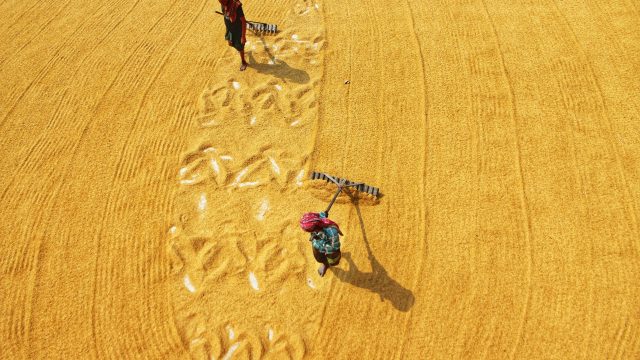The Dasgupta report can change economics - and the world
For too long traditional economics has completely ignored nature and the environment - to the detriment of both.

The GEC Insights series explores the intersection of environment and economics, written by leading thinkers from the worlds of business, government and civil society. Part of our Economics for Nature project, they bring together diverse perspectives to answer the question: how can we re-design our economies to protect and restore nature?
In this article, James Vause, Lead Economist at the UN Environment Programme World Conservation Monitoring Centre, reflects on the forthcoming UK Dasgupta review on natural capital, and asks - can one report change an entire discipline?
Twenty years ago, I was in the last year of my undergraduate economics degree. On the whole, I’d enjoyed my studies. But I’d also always been interested in the natural world, and somehow the economics I experienced during the first two years of my course seemed totally divorced from that.
Luckily, my final year included a lecture series focused on economic growth. Although you wouldn’t guess from the title, these lectures brought the relationship between economics and the environment to life. I learnt that mainstream metrics of economic progress like GDP were not designed to measure human wellbeing. I learnt that wellbeing related to wealth – measured in terms of capital stock, but not manufactured capital like machines and factories, but social, cultural, and natural capitals too. I learnt that whilst we could boost GDP by depleting our natural wealth – for example, by logging a rainforest to sell the timber – this would have ramifications for future growth and living standards. Everything was starting to make sense again – this was what I (and mainstream economics) had been missing.
That lecture course was taught by a man called Partha Dasgupta.
The same man is, of course, now leading the eponymous Independent Review of the Economics of Biodiversity commissioned by the UK’s Economics and Finance Ministry, HM Treasury. Having been inspired by Professor Dasgupta as a student, I’m excited to see him leading this Review. And I’m hopeful that, with the team behind him at the Treasury, his report can change economics for the profession at large, just as his lectures did for me.
An ominous forecast
It’s a big task. The Interim Report, published in April, set out the scope of the challenge, highlighting enormous problems in how our economies currently relate to the natural world.
At a very basic level, the Interim Report shows that by systematically undervalued nature, over time the world economy has ended up holding a very inefficient mix of assets to underpin our wellbeing. That is, we have too little nature relative to other capitals, and the economic returns to redressing this would be great.
Worse still however, it highlights that we are continuing to draw down this natural capital stock significantly by consuming natural resources faster than they can regenerate and polluting the biosphere beyond its capacity to regenerate.
Furthermore, based on long-term trends, the Review also shows that reducing our demands on the biosphere to sustainable levels, where they can be supported without further declines in our stocks of natural capital, is not possible if we rely on improvements in efficiency and technology alone.
“ Reducing our demands on the biosphere to sustainable levels is not possible if we rely on improvements in efficiency and technology alone.”
It is not a particularly rosy picture. As trailed in the Interim Report, this means the Review will need to tackle difficult questions that go well beyond simply resource efficiency. These include finding balance around meeting the needs of growing populations in this context of declining natural resources; simultaneously restoring the health of our planet in the same circumstances; and addressing lifestyle related challenges especially those connected to inequality, both within and between generations.
A new approach to economics
Significant and coordinated action is needed. The Review promises to examine options to deliver transformative change across a number of areas; how economic models and evaluation processes can be reformed to reflect the fact that the economy is embedded in nature, how we can measure our economic progress better; the institutions we need to make wiser choices; and the array of potential actions across government, business and finance which could move us closer to sustainability.
There’s no doubt that the Review will be well timed. As countries around the world move towards recovery from the impacts of the COVID pandemic, governments, investors and businesses are already demonstrating a renewed appetite for policies that deliver resilience, sustainability and long-term stability. Commissioned by a Ministry of Finance, the Dasgupta Review will send a powerful message about the importance of changing our economic relationship with nature in this context as well as more broadly.
With a decade left to meet the Sustainable Development Goals, a decade that has been designated the UN Decade on Restoration, and a decade which will soon see new global goals in a framework for protecting nature (at the postponed Convention on Biological Diversity Conference of the Parties) there is an important opportunity to build new global commitment change.

To deliver an economy which is embedded in nature will require more than commitments and policy strategies, however. It will require real change, and the Dasgupta Review can’t deliver that on its own. The Review and the Review Team have only had one year to work. Research questions will remain unanswered, data gaps unfilled, and policies unevaluated. But perhaps more importantly – although there are pockets of good practice around the world – there will still be a void in the experience of officials in economics ministries, central banks and across government more broadly in designing and delivering economic policy that fits within the constraints of the biosphere. Sustained and proactive engagement, experience and knowledge sharing will be key.
A call for action
From this perspective I would like the Dasgupta Review to be a rallying call. Those of us already working in the field need to be ready to support the response to the Dasgupta Review, whether that is through more primary research or capacity building across the world. Researchers and practitioners will need to collaborate and coordinate, and reach out to colleagues in mainstream economic spheres. The Review’s real impact will come once the options for action have been absorbed into day-to-day practice, and it is important that we start that process as soon as possible.
In spite of this, perhaps my favourite part of the Dasgupta Review Interim Report, isn’t the part which is directly connected to my professional life. It is the part that reflects that these technical, policy and political changes need support too.
The Interim Report highlights that our sustainable future relies upon individuals caring about and understanding nature, and issues a plea for “a transformation of our education systems towards one where children from an early age are encouraged to try and understand the infinitely beautiful tapestry of processes and forms that is Nature”. The report concludes that “it is only when we appreciate that we are part of Nature and that Nature nurtures us that we will have fewer needs for reviews on the economics of biodiversity”.
This doesn’t diminish the need to act on the Review now, but flags the importance of people and their preferences both in realising and maintaining a safe operating space for humanity in the biosphere.
It also reflects back to the start of my story here. I wonder how different the world might be if the relationship between economies and nature – an issue that seemed to pop up almost by luck at the end of my undergraduate degree – was in fact the foundation of all economics teaching around the world?
Maybe we are about to find out.
- James Vause, Lead Economist, UNEP-WCMC
Photo by Lukasz Szmigiel on Unsplash


